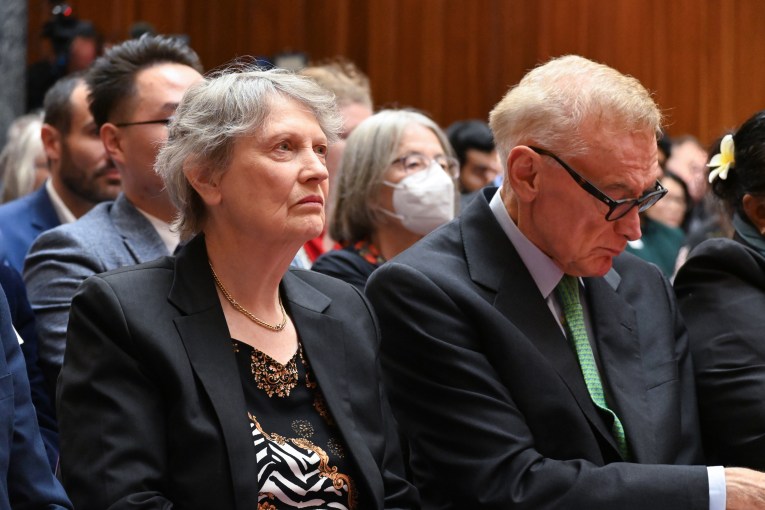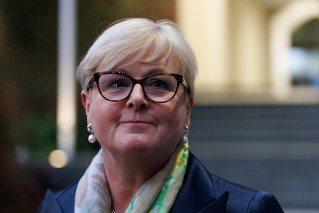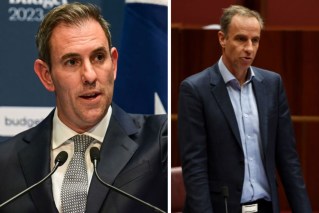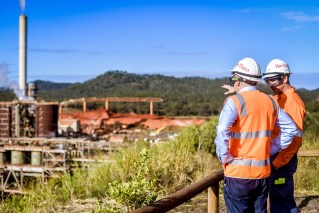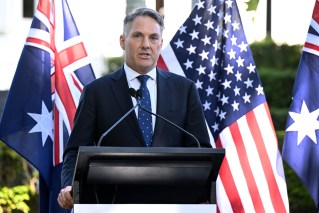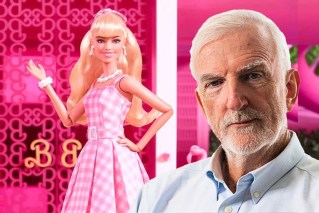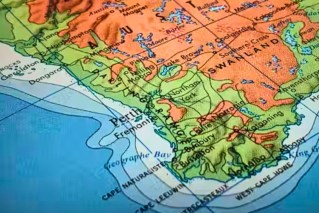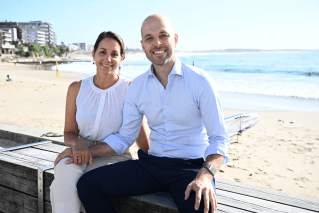What a gruelling, six-week campaign has revealed about Anthony Albanese

Every indication he was standing on the cusp of narrow, glorious victory began turning late in the campaign, but Anthony Albanese seemed untroubled but also unhurried.
On Thursday, Mr Albanese arrived for another round of conflict with the travelling press, who have applied a level of sometimes-shouty scrutiny to his campaign that one respected senior journalist said on Thursday had become “embarrassing”.
The press pack protests that Mr Albanese has not answered questions directly and should have released his policy costings earlier.
But seemingly a great deal the ALP leader says or does can form the foundations of a smash-up in this campaign.
On Thursday, more punishment followed after Mr Albanese sparked rebellion from reporters for his plans to fly to campaign in Queensland while leaving the press in Canberra to study the policy costings documents they had clamoured for.
Journalists said he had spurned his democratic obligations; he offered his apologies and promised to let them travel freely. A blog update soon flashed: “Campaign chaos: Albanese in media U-turn”.
Mr Albanese’s capacity for pushing through setbacks says much about a political style that capitalises on personality attributes not so common in modern politics.
This election campaign has been marked by immediate predictions of his demise but he has continued, despite some criticism while he learns from others.
On Thursday, he used ridicule to change the rhythm of an interrogation about whether he had planned to duck media scrutiny before securing clear air to make the case he had faced plenty of scrutiny.
“I will miss you dearly,” he said to a reporter.
“I’m happy for you to come with me, wherever you want.”
Tweet from @Qldaah
Not unlike his journey to become potentially Australia’s next prime minister as he is knocking 60 and in his third decade in Parliament, Mr Albanese’s campaign corrections do not happen urgently.
But, after exerting more control over the flow of a campaign press conference and a commanding final pre-election speech, he is now where he needs to be.
In a world where political lives are growing ever shorter, his endurance and a long view on what matters sets his leadership apart.
His life story is often told as that of a man who seems to surprise people with an ability to succeed against expectations. So it has been in life and politics.
Australia’s next potential prime minister is the son of a single mother from a council flat, as is well known. But perhaps even more remarkably he is a son of the NSW Labor Left.
That background meant when Mr Albanese made moves on the top job in Labor he required a new wardrobe but also a comprehensive accommodation with the business community.
But the way in which he has adapted to the demands of leading a major party tells us the most about how he might govern and if governing might also shape him.
The knock on the Opposition Leader’s approach to campaigning is that his public appearances and the less-than-unremitting pace he sets while travelling suggest his heart is not really in it.
One observer made this point with an unfavourable comparison with Tony Abbott, who on election eve made a very macho show of going without sleep for 36 hours on the way to a close election finish.
Media conflict
Truth be told, a claimed Labor campaign “blitz” kicking off on Thursday and duly reported in the media in fact involved a few short pit stops – nothing like the former Liberal PM’s feat of strength.
But a counter-argument might be this: For too long Australian politics has been selecting for weirdos who relish weird campaign trail interactions such as pretending to talk casually with strangers while being filmed by the national media.
That Mr Albanese does not seem keen on political theatre could commend him for a job whose recent occupants have disappointed most people.
But it does complicate his relationship with some sections of the media-political classes predisposed to a view that politics is always consequential and, like a real-life episode of The West Wing, and can be carried out only at an all-consuming pace.
On Thursday, Mr Albanese flatly rejected a question asking him to nominate the priorities for his first 100 days in office, saying such promises were counterproductive.
The promise of soft media coverage has helped plenty of his predecessors overcome such objections.
Breaking the mould
His office is also yet to begin seriously engaging in media manipulation games over the distribution of exclusive stories that has become the rule for Australian prime ministers. But there is yet time.
So much of Mr Albanese’s political style is a rejection of up-tempo government and the 24/7 news cycle; he is one of the few MPs in Canberra who actually pre-dates its existence.
His time off the campaign with COVID-19 is a good example.
Labor argued that slowing down and withdrawing from a six-week campaign would help; the idea was inconceivable to people who could not see beyond politics.
To his critics it was proof that he is not much chop as a campaigner.
But Mr Albanese showed himself ready to break other rules, such as bringing his front bench colleagues to the centre of the campaign despite inevitable stories laced with leadership speculation.
By showing that he could see his own limitations, Mr Albanese has marked himself as a leader with a consensus style not seen for a very long time.
That is not to say he is not cynical.
His refusal to surrender costings early – while undeserving of being shouted at – is, at its core, about prioritising politics over transparency, which is not unusual.
He laughed on Thursday at the suggestion that Labor should not have a child care policy subsidising rich parents on incomes of up to $500,000 a year.
And while he calls Mr Morrison a man obsessed with division, Labor is running a targeted Medicare scare campaigns across regional NSW.
“Doesn’t this just show that you’re just another politician?” said one of his interrogators on Thursday.
It is unclear what he might have otherwise been since being elected in 1996.
But Mr Albanese does seem to have recently developed a callousness needed to make the sometimes expedient and occasionally morally dubious decisions that might keep a prime minister in office.
His policy platform has shrunk, but is still recognisably a Labor agenda.
Only by taking steps like these could Mr Albanese securing the backing of millions of Australian voters and stand a chance of being at the apex of government.
They had to be matched by other changes to take on a sense of authority that leadership requires.
During a 2013 debate for the Labor leadership contest he presented as ill at ease, even in front of party allies on his home ground of Trades Hall. He wore baggy suits and slouched back in a way that made him sound like he was gargling words.
As he draws himself up to meet reporters’ questions and occupies space in front of TV cameras with purpose, it is clear that Mr Albanese’s changes have been more than cosmetic.
And while he has changed plenty there are ways he remains himself enough that he could yet change the way we think of leadership.
All that is left is to see if he can proceed slowly across the finish line of Australian politics.
